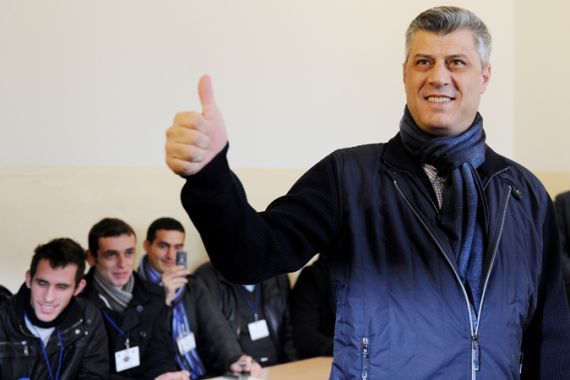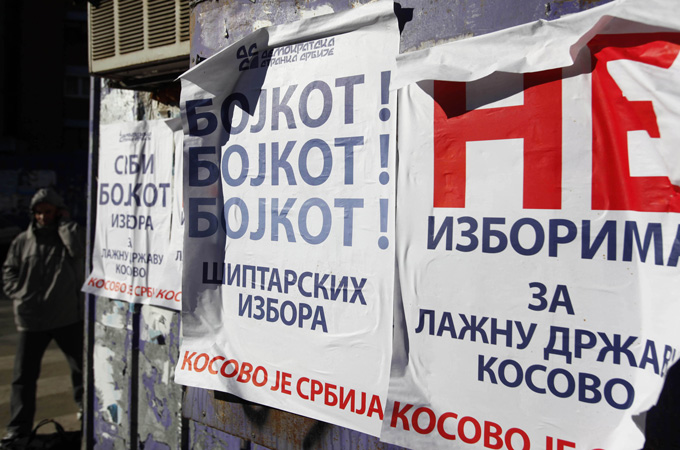Exit poll: Kosovo PM ‘leads’ vote
Hashim Thaci’s Democratic Party of Kosovo has garnered 31 per cent of the vote, exit poll says after close of voting.

Tim Friend reports from Pristina on preparations for the parliamentary poll
The party of Kosovo’s prime minister is ahead in the territory’s first parliamentary elections held since it declared independence from Serbia in 2008, according to an exit poll released after voting closed.
Prime Minister Hashim Thaci’s Democratic Party of Kosovo has secured 31 percent of votes in Sunday’s election, with the Democratic League of Kosovo trailing with 25 per cent of the vote, according to the poll by Kosovo’s Gani Bobi Centre.
If confirmed, the results would leave Thaci’s party needing to form a coalition to govern. Sunday’s snap vote was held after a previous coalition government headed by Thaci lost a vote of no confidence on November 2.
Polls closed at 1800 GMT after a day that passed off without serious incident. With 1.6 million people eligible to vote for the 120-seat parliament, 29 political parties, coalitions and citizens’ initiatives took part in the race.
Ten of the parliamentary seats are reserved for minority Serbs, and the electoral commission said that eight of the parties on the ballot represent the 120,000-strong community.
Serb boycott
But as expected, Serbs in northern Kosovo maintained an almost total boycott of the elections, heeding calls from Serbia’s leaders, who still consider Kosovo part of their country.
A post manned by Kosovo’s Nato police force came under attack with small arms fire overnight in the predominantly-Serb north, according to Al Jazeera sources.
A note was reportedly left at the scene saying: “This is only the beginning… Next time we will not shoot in vain. Do not bring election material here!”
Polling closed early in northern Kosovo as a result of the tension and the low turnout. “”Due to a tense situation the poling stations decided to end their work (in the north) at 4 pm (1500 GMT). There were no incidents,” Valdete Daka, Kosovo’s electoral commission chairwoman said.
“This is the area of Kosovo where, if there was going to be a flahpoint, this was the likely spot,” Al Jazeera’s Tim Friend, reporting from Pristina, said.
In Serbian enclaves further south, which do not border Serbia proper, observers reported Serbs turning out in unprecedented numbers.
Thaci had called upon minority Serbs to break with tradition and vote, urging them to build a common future for all Kosovars.
“Kosovo is voting today for a European future, for visa liberalisation and (…) and integration into the European Union and the United Nations,” he said as he cast his vote.
Economic woes
The main contenders in the election are the two largest political parties, Thaci’s Democratic Party of Kosovo and its former junior coalition partner, Democratic League of Kosovo (LDK).
His main rival, the LDK, entered the election bruised by a power struggle, while the Alliance for the Future of Kosovo was weakened because its leader, former fighter Ramush Haradinaj, is being retried on war crime charges by a UN tribunal.
 |
| Belgrade has urged Serbs living in Kosovo not to take part in the vote [Reuters] |
Thaci has promised integration with the European Union and NATO military alliance, while also vowing to double the budget and raise civil servants’ salaries by up to 50 per cent.
The national unemployment rate is running at 48 per cent, according to the World Bank. More than 60 per cent of the Kosovo population is under 25 and youth unemployment stands at more than 70 per cent according to some estimates.
“In everyone’s minds now, I think, there is this sense that the economy does need to be addressed,” Al Jazeera’s Friend said.
“The declaration of independence brought about a euphoric atmosphere but now the hard economic reality is being to impinge on people’s lives again.”
Isa Mustafa, the LDK leader and mayor of Pristina, has run his campaign on a strong anti-corruption platform after a number of members of Thaci’s party were tainted by scandal.
The election campaign has also seen several newcomers, including Albin Kurti, a former student activist, whose Self-Determination movement advocates Kosovo’s unification with Albania and rejects talks with Serbia.
Kurti said he believed that the people had held “high expectations” about the declaration of independence but that only politicians had benefited.
“People see that the main beneficiaries of this formal independence have been politicians not the citizens,” he said.
European hopes
For majority ethnic Albanians, the ballot was held amid hopes that it will inch the struggling territory closer to eventual membership of the EU, even as the 27-member bloc shows a weakened resolve to take in new members dogged by the global financial crisis.
The European Parliament mission to the territory urged all political parties to ensure a free and fair electoral process on Sunday.
“It is fundamental for any democratic state and crucial for Kosovo’s EU integration process,” Doris Pack, the head of the mission, said.
So far, around 70 countries have recognised Kosovo as an independent state, including the US and Japan. Five members of the EU have refused to recognise Kosovo as an independent state.